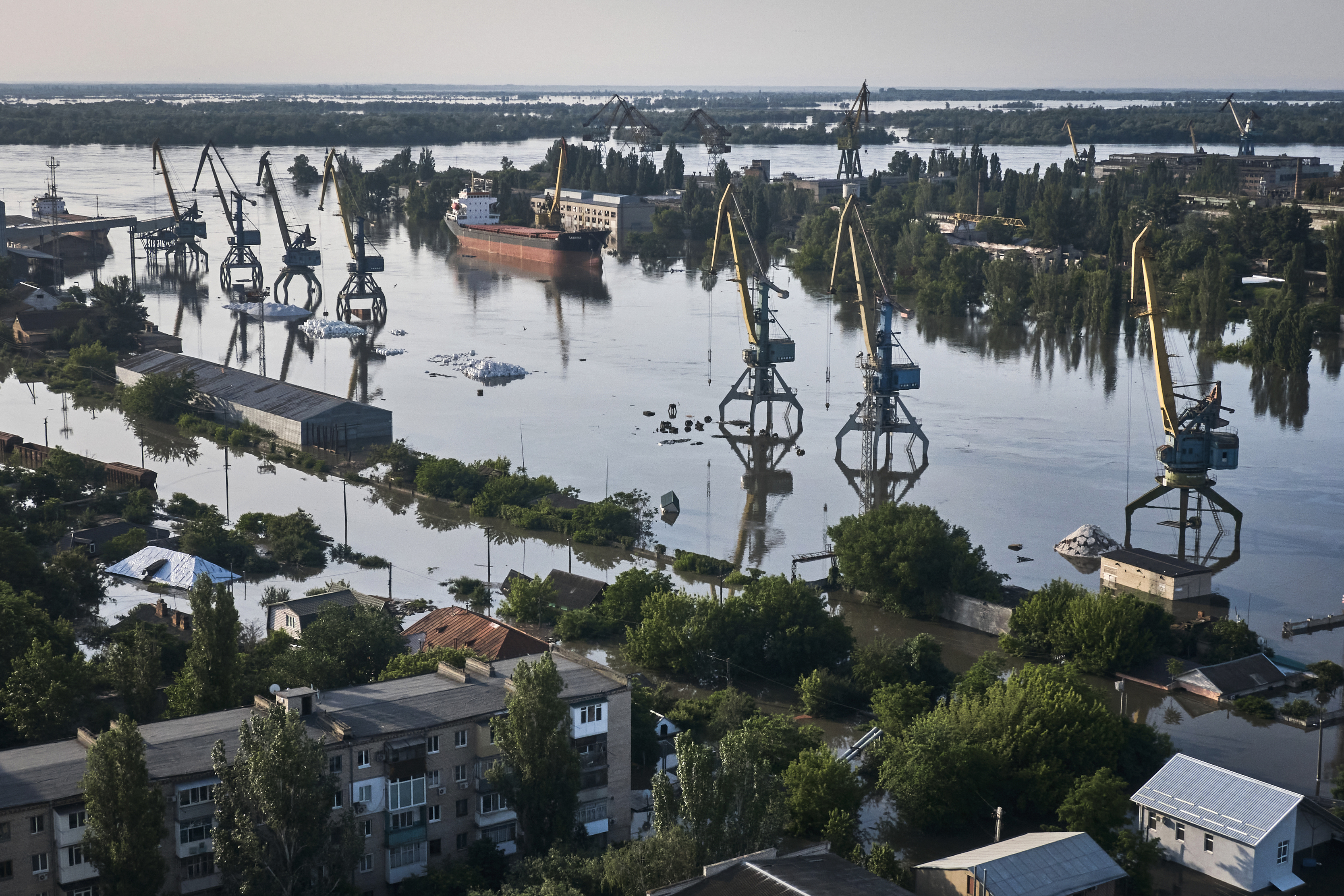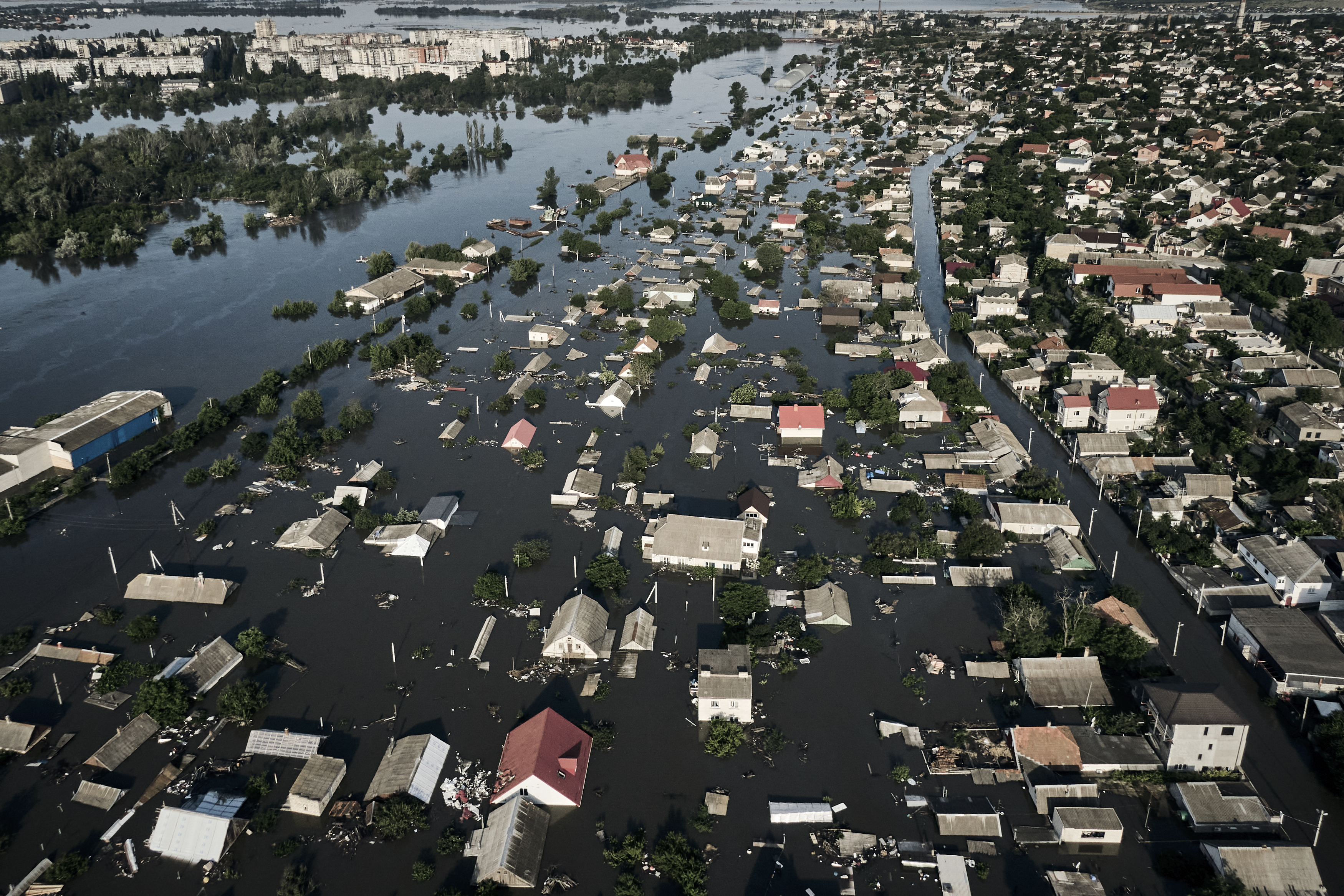
Kyiv, Ukraine – Among displaced communities along the banks of Ukraine’s Dnipro River, bottled water has become the most coveted commodity.
The destruction of the Nova Kakhovka dam on June 6 in the southern region of Kherson unleashed 18 cubic kilometres (4.3 cubic miles) of water that submerged villages and farmland.
While water is all around, none of it is drinkable.
“It is all poisoned,” Pavlo Khrapun, a humanitarian worker with the NGO Project Hope, told Al Jazeera.

The man-made flood washed away chemical fertilisers from cultivated fields, flushed away pollutants from the riverbed, submerged cemeteries and released at least 150 tonnes of machine oil from the breached dam with additional fuel and industrial waste likely to have been discharged from plants around it.
Khrapun, an expert in WASH – water, sanitation and hygiene – said his team has been working non-stop to deliver drinking water amid the almost constant sound of shelling and the threat posed by anti-tank and amphibious mines dislodged by the deluge.
“People are very tired, very stressed, but mutual help motivates them,” Khrapun said. “They are focused on helping each other.”
Floodwaters contaminated with chemicals and by bodies of people and animals are not just undrinkable. They also raise the risk of waterborne diseases, including diarrhoea and cholera.
‘An absolute calamity’
The United Nations estimated an “extraordinary” 700,000 people are in need of clean drinking water.
UN Undersecretary General Martin Griffiths told Al Jazeera the dam breach is certain to have repercussions that will be felt for years to come.
“This is an absolute calamity,” Griffiths said.
Days after the explosion that caused the dam to collapse, Ukraine is still trying to find words for what it considers a crime.
President Volodymyr Zelenskyy accused Russia of deliberately blowing up the dam and said the sabotage amounted to a “war crime”, “an act of terrorism” and “brutal ecocide”.
The portmanteau word, which combines “ecology” and “genocide”, describes the wilful destruction of the environment as a weapon of war and is codified at the national level by a few states.
Proponents have yet to secure its adoption under international law, but Ukrainian activists are hopeful the circumstances of Russia’s war on Ukraine could create momentum to do so.
Russia has denied causing the explosion at the dam as Ukraine was preparing to launch a counteroffensive and said Kyiv is responsible.
Yevheniia Zasiadko, head of the Climate Department at Ecoaction – Centre for Environmental Initiatives in Kyiv, said the dam breach wiped out plant and animal species at risk of extinction, including the squacco heron and the little egret, and caused widespread and long-lasting damage.
“There aren’t any doubts that this constitutes the crime of ecocide,” Zasiadko told Al Jazeera.

Ecoaction said a number of habitats protected under the Convention on Wetlands of International Importance are likely destroyed or severely polluted, including the Black Sea Biosphere Reserve, a UNESCO biosphere reserve; the Kinburn Spit Regional Landscape Park; and numerous smaller sites.
“The consequences will be felt not only by the nature reservoirs downstream but also upstream,” Zasiadko said, adding that the areas spared by the flood were nonetheless dependent on the Kakhovka Reservoir’s water.
The Ukrainian Nature and Conservation Group said in a report that forestry resources may also suffer.

Large areas along the south bank of the Dnipro River are home to Crimean pine, common pine and white acacia, none of which is well-suited to prolonged moisture exposure.
“Consequently, these tree species may perish due to the extended period of flooding,” the group said.
Debris from destroyed infrastructure and natural and man-made waste were spotted littering Odesa beach, causing concerns to mount for the Black Sea marine ecosystem.
“The scale of destruction of wildlife, natural ecosystems and entire national parks is incomparably greater than the consequences for the wilderness of all military operations since the start of the full-scale invasion in February 2022,” the report concluded.
Polluting the world’s breadbasket
Griffiths, who also serves as the UN’s emergency relief coordinator, said the ravaging of “one of the world’s most important breadbaskets” will almost inevitably lead to lower grain exports with repercussions for global food supplies.
Ukraine’s Ministry of Agrarian Policy and Food estimated that the flooding affected 100sq km (40sq miles) of farmland on the right bank of the Dnipro River, which is under Ukrainian control.
Monika Tothova, economist at the UN’s Food and Agriculture Organization, told Al Jazeera that no specific information was available on the damage to agricultural land under Russian control.
“Based on the satellite images and modelling of the flooding, “it is very likely this year’s harvest will be a complete loss, depending how long the water stays,” Tothova said.

The extent of the damage will depend on the scale of the floods and how fast the waters recede, the economist added.
Beyond the province of Kherson, the dam also provided a vital source of irrigation to the Mykolaiv, Zaporizhia and Dnipropetrovsk regions and their wheat, barley, millet, rapeseed and sunflower crops.
Russia’s war in Ukraine and the severe reduction in farms exports triggered a global food crisis last year, which the UN worked to mitigate by negotiating a grain export deal between Kyiv and Moscow with the help of Turkey.
Griffiths told The Associated Press in an interview that while he was working alongside UN trade chief Rebeca Grynspan to ensure the extension of the Black Sea Grain Initiative, the impact of the dam breach posed a series of problems of “a whole new order of magnitude”.
This is “a viral problem”, he said. “The truth is this is only the beginning of seeing the consequences of this act.”
Reporting by Mansur Mirovalev in Kyiv and Federica Marsi in Milan.







